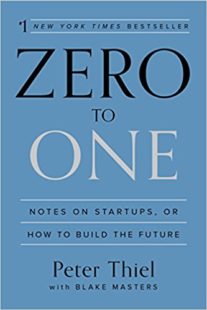There is no shortage of tech startups in the world, but very few have what it takes to become truly successful. Over 50% of startups fail within the first four years.
However, we noticed a pattern that the greatest, most successful startups have in common.

Zero to one
by Peter Thiel
⏱ 14 minutes reading time
🎧 Audio version available
They’re Leaders Instead of Followers
One of the most popular slogans of the twenty-first century is Apple’s “Think Different”.
There is never a shortage of tech companies that jump on new trends. And while some may receive initial success, they’ll never make it in the long run. It’s better to come up with an entirely new idea than to improve on something that is already established.
Why? Because the companies are not leaders. The most successful ones are those that make trends instead of following them.
That means that when they look at their competitors, they don’t do it to steal their plans or mimic them. They do it so that they can improve.
Yes, it’s a lot riskier, but the results are far more rewarding.
They’re Not Afraid to Change
What’s one thing Nokia, Netflix, Nintendo, Facebook, and Apple have in common? Their admirable ability to be fearless about change. In fact, these amazing companies aren’t just open to change; they welcome complete renovation.
If we’re talking about fields that are always progressing, then technology is at the top of the list. Startups that want to stay ahead of the curve aren’t afraid to change.
Businesses are constantly changing. And when you add technology into the mix? It’s a death sentence to stay the same. After all, do you think Facebook would be as popular as it is if it hadn’t changed for the last decade?
These companies chose to adapt because they understand that just because something works today, and appeals to customers’ needs right now, doesn’t mean it will continue to satisfy in the long term. Now more than ever, companies need to keep up with the rapid advancements going on.
Take Netflix, for example. Not everyone knows that Netflix used to send DVDs by mail. When Reed Hastings originally founded Netflix in 1997, that was how they interacted with their customers.
In 2001, Hasting realized that times were changing, and Netflix needed to do as well. So, he got the idea to stream movies online. They rolled with the advancements and have hundreds of millions of subscribers around the world.
They Focus on Users
One thing that all wildly successful companies share is that they provide a product or a service that users want. Sometimes, users don’t know they want that product, but successful companies are the ones who are able to convince them otherwise.
No matter how much you spend on ads, marketing campaigns, and free giveaways, no company will stay afloat long if it doesn’t serve its users. This focus on what customers require will have them coming in droves– which is exactly what happened to the likes of Apple. What smart startups do is focus on the satisfaction that can only be gained by designing products with the user in mind from the get-go. And it’s not just that.
Since customers have ever evolving needs, a brilliant startup will need to evolve right alongside them to keep meeting those expectations.
What this does is form a valuable relationship with the users– after all, they’re the ones supporting you, trusting you with their money, and relying on your service. Paul Graham, a co-founder of Y Combinator, which is a company that provides seed funding for startups and has launched over 2,000 companies, including the likes of Airbnb, DoorDash, Dropbox, Reddit, and Twitch, says, “Though the immediate cause of death in a startup tends to be running out of money, the underlying cause is usually lack of focus.”
They Start Small
Entrepreneurs look at massive companies and think there is no way they can grow to that size, but that’s a misconception. See, those goliaths started out as small as can be– as small as a garage, which is the case of Jeff Bezos’ company, Amazon.
Amazon also started out with one focus, being an online bookstore. Now, they offer everything from streaming services to just about any product you can think of.
Starting small doesn’t mean just starting in a small space. It means that they have a single focus, one thing they can do better than anyone else in the game.
That’s how successful tech startups grow. Because they have a specific vision that makes them stand out.
Sure, once the companies have survived the initial phase and can afford to grow, diversifying their service is highly advisable, which is something we’ll come back to in a minute. But what’s important is they make sure they don’t stretch themselves too thin, especially in the beginning.
Take one of Y Combinator’s most successful companies, Dropbox. What does Dropbox do? It’s known for its ability to help people upload and share files. Similarly, Snapchat’s focus is allowing users to share photos and videos that have a time limit. So, the greatest startups begin with a singular, simple product or service that then expands as users start demanding more.
They Build A Platform
This one is a little complicated, but one thing that a lot of successful tech startups have in common is they built their own platforms.
In this modern-day and age, where the internet has utterly changed how we do business, the most successful companies are the ones that are able to sell more than just a product.
But what exactly is a platform? In a nutshell, it’s a business model. A place where consumers and producers can interact.
Think about the biggest tech giants you can think of– Facebook, Google, Amazon– even Tesla’s website where you can design your own Tesla car.
Most of these names, when you think of them, you think of their platform, not of the products they sell on that platform. There is nothing wrong with companies looking to sell their products, but these tech giants have proven that it’s way more profitable to establish a platform.
Even traditional businesses have jumped on this strategy, not just Tesla. GM and Ford built their own platforms. Nike did as well.
The core identity of your business is your own, but embracing technology and using it to your advantage to build innovative platforms is money in your pocket.
They’re Passionate
Another important piece in a company’s future success is passion. The most successful of founders are known to be extremely passionate about their ideas and visions.
Starting a business in the pursuit of money in mind won’t lead to success. It’s passion that keeps a startup going. Wasn’t it Steve Jobs who said, “You have to be burning with an idea, or a problem, or a wrong that you want to right. If you’re not passionate enough from the start, you’ll never stick it out?”
It’s this passion that inspires not only success, but also other people to follow you there. A founder’s passion helps encourage innovation and creativity in the workplace and makes employees more loyal to their employers.
And everyone knows that in order to achieve wild success, you need to have the right team at your back, which leads us to our next point.
They Have the Right Teams
It takes a team of motivated, passionate, and talented people to build a successful empire. Finding the right team is crucial. New startups can’t afford to hire deadweight or bad fits.
Founders need teams because these individuals are the ones who keep them in the loops of whatever they can’t keep up with alone. Since everyone brings a different talent, and viewpoint, to the table, a team provides a broader perspective.
In addition, a lot of investors are known to provide money only if they trust that your company has a qualified team in place. Numerous studies have found that the founding team is arguably more important to a startup’s success than the product it provides.
What Is Snapreads?

With the Snapreads app, you get the key insights from the best nonfiction books in minutes, not hours or days. Our experts transform these books into quick, memorable, easy-to-understand insights you can read when you have the time or listen to them on the go.


